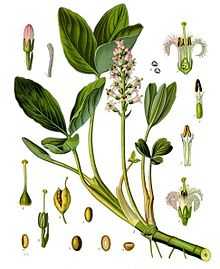Menyanthaceae
| Menyanthaceae | |
|---|---|
 | |
| Menyanthes trifoliata | |
| Scientific classification | |
| Kingdom: | Plantae |
| (unranked): | Angiosperms |
| (unranked): | Eudicots |
| (unranked): | Asterids |
| Order: | Asterales |
| Family: | Menyanthaceae Dumort.[1] |
| Genera | |
| |
Menyanthaceae is a family of aquatic and wetland plants in the order Asterales. There are approximately 60-70 species in five genera distributed worldwide. The simple or compound leaves arise alternately from a creeping rhizome. In the submersed aquatic genus Nymphoides, leaves are floating and support a lax, umbellate or racemose inflorescence. In other genera the inflorescence is erect and consists of one (e.g., Liparophyllum) to many flowers. The sympetalous, insect-pollinated flowers are five-parted and either yellow or white. The petals are ciliate or adorned with lateral wings. Fruit type is a capsule.
Species of Menyanthaceae are found worldwide. The genera Menyanthes and Nephrophyllidium grow only in the northern hemisphere, while Liparophyllum and Villarsia occur only in the southern hemisphere. Nymphoides species have a cosmopolitan distribution.
Menyanthaceae species are of economic importance as ornamental water garden plants, with Nymphoides being most commonly traded. The practice of growing non-native water plants has led to several species becoming naturalized or invasive.
Dimorphic heterostyly occurs in all genera but Liparophyllum. In addition, four species of Nymphoides are dioecious.
References
- ↑ Angiosperm Phylogeny Group (2009). "An update of the Angiosperm Phylogeny Group classification for the orders and families of flowering plants: APG III" (PDF). Botanical Journal of the Linnean Society 161 (2): 105–121. doi:10.1111/j.1095-8339.2009.00996.x. Retrieved 2013-07-06.
External links
| Wikimedia Commons has media related to Menyanthaceae. |